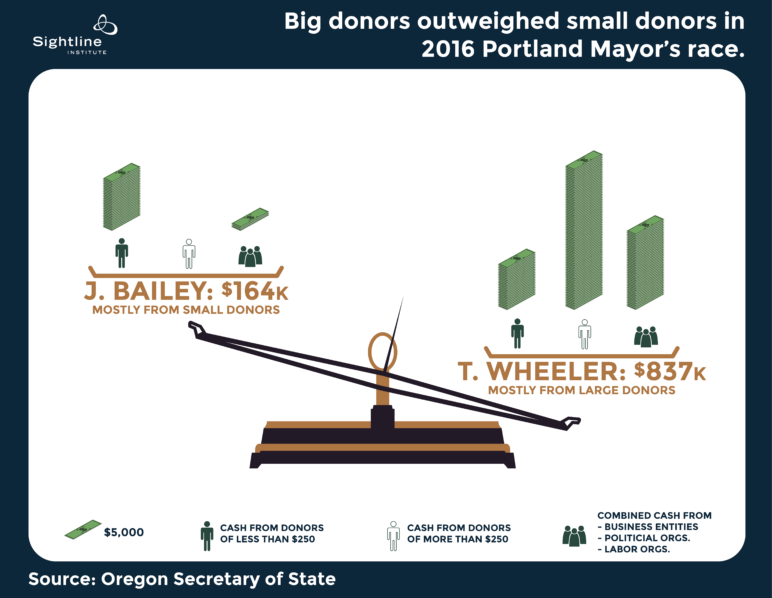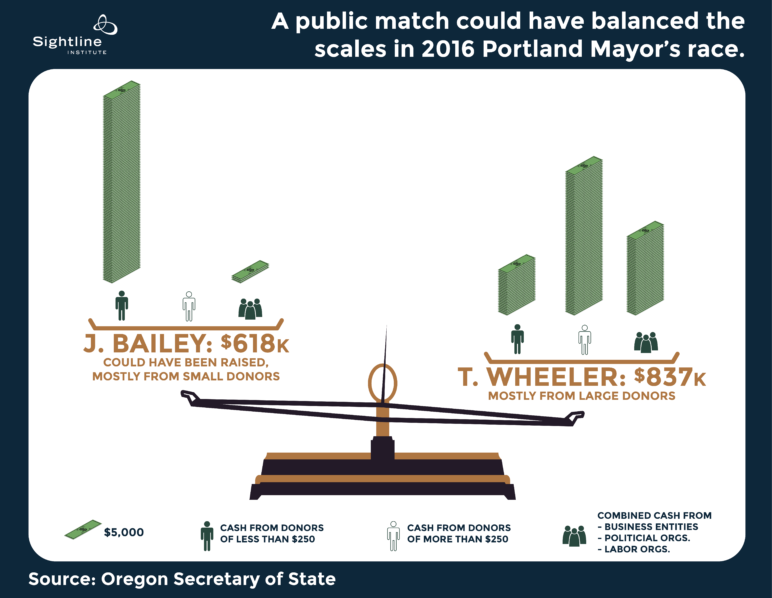All candidates should have the option to run for office with support from everyday people, not just those who can write big checks.
In 2016, one Portland mayoral campaign funded entirely by small donors giving $250 or less faced off against another campaign funded mostly by wealthy donors and business interests giving unlimited amounts. The big checks from a few donors far outweighed the small checks written by thousands of Portlanders. But if the Portland Open and Accountable Elections ordinance had been in place, everyday Portlanders could have given the big donors a run for their money.
Portland mayoral candidate Jules Bailey voluntarily limited campaign donations to no more than $250, while candidate Ted Wheeler did not. The result was a fundraising blowout. Wheeler, state treasurer of Oregon, raised nearly $840,000 in the eight months from when he declared his candidacy until the primary election in May. Bailey, a Multnomah County commissioner, raised just over $160,000 in his five months on the campaign trail.
Wheeler won handily, with 55 percent of the vote to Bailey’s 17 percent, ending the contest.
Notably, Bailey attracted nearly the same amount of support from individual small donors as did Wheeler: Bailey raised $150,000 from nearly 1,300 people giving $250 or less, and Wheeler raised $130,000 from 1,500 people giving at the same level. But Wheeler also raised $470,000 from just 400 wealthy individuals and nearly $140,000 from business donors, tipping the scales.

To compete with Wheeler, Bailey could have lifted his self-imposed donation cap and courted wealthy donors. Or if Portland, like many other US cities, had had a public match program in place, small donors could have competed on a more level playing field with big donors. With a public match of 9-to-1 for donations up to $30 and 1-to-1 for donations up to $250, Bailey would have raised nearly $620,000 from the same donor base.
Likely, with a public match, a strong small-donor candidate like Bailey would have raised even more money and reached a more diverse pool of Portland voters. Other cities’ experience with public match programs indicates that when a $10 donation is actually worth, say, $70, candidates reach out to more people, including those who have not previously donated to campaigns, and candidates end up raising more money and engaging more people in civic life.
But even conservatively assuming that under a match system, Bailey would not have expanded his donor base, a match system, applied to the donors who did give to Bailey, would have balanced the scales. It would have significantly leveled the playing field between a campaign powered exclusively by small donors and a campaign bankrolled by wealthy donors and business interests.

Wheeler’s campaign raised over $800,000 and won over 100,000 votes, a ratio of about $8 per vote. Bailey’s campaign raised $160,000 and won nearly 32,000 votes, or about $5 per vote. If Bailey’s small donors had been matched and his dollars per vote ratio held, he may have won 120,000 votes and overtaken Wheeler.
Of course, campaign contributions don’t buy votes, and none of this suggests that Bailey could have or should have won the 2016 competition. Better funded candidates do not always win, as Jeb Bush could tell you, and some better funded candidates are better funded because they’re better candidates: more inspiring, better organized, and better at mobilizing contributors and volunteers.
But all candidates should have the option to run for office with support from everyday people, not just those who can write big checks. With a public match program, Ted Wheeler could have capitalized on his broad base of small donors and foregone asking for money from his list of 400 large donors and nearly 100 business contributors.
Moreover, a public match system allows more of those same everyday people to run for office themselves. Sarah Iannorone also made a good showing in the Rose City mayoral race this year. As a car-free working mom from southeast Portland, she might have been able to run an even more competitive campaign under a public match system.
Indeed, the entire field of candidates and their respective campaign strategies might have been different if a public match had amplified everyday Portland voters’ donations against those of big donors. Portland Open and Accountable Elections has the potential to unleash this kind of change, enabling candidates to run campaigns by appealing to everyday people, and empowering average Portlanders to participate in local elections and help shape the city’s future.
[button link='{“url”:”http://www.sightline.org/2016/05/27/in-portland-elections-600-big-donors-tip-the-campaign-scales/”,”title”:”In 2012, 600 big donors tipped the Portland campaign scales. Read about it here.”}’ color=”green”]


Comments are closed.